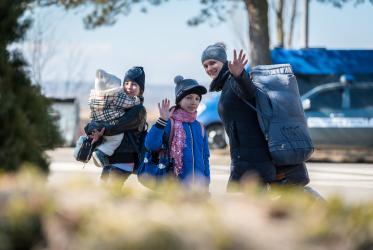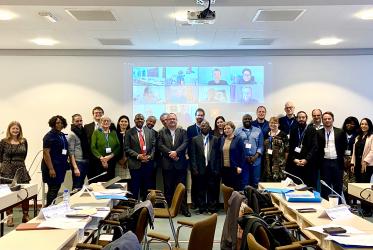Returning from another visit to Iraq alongside Carla Khijoyan, the World Council of Churches' Middle East programme executive, and Fr Emanuel Youkhana of the Christian Aid Programme Northern Iraq (CAPNI), many images fill my mind: images of destruction, and of life hesitantly picking up again. Many uncertainties remain, prompting us to bend our heads and raise our prayers to the Lord.
In Baghdad
A driver takes us to various meetings around Baghdad. While he drives us to patriarchs, to bishops, to ministries and to an interreligious meeting, he tells us telling about his hometown or home village – Batnaya.
He comes from a town or village taken by Daesh on the Nineveh plain. When Daesh arrived in the area in 2014, he happened to be in Mosul on a visit, he fled at once from there.
Now he has been back to his hometown, Batnaya; more than 70% of the buildings are damaged. Some are completely destroyed, and the village is deserted. The destruction has taken his childhood, his memories, he says with a voice that is shaky with emotion.
His town was used as a base camp by Daesh; from there they fired artillery against surrounding villages and against Peshmerga troops when the alliance began to expel Daesh. In the village there were only Daesh fighters at that time, everyone had fled in a great rush before Daesh took the village.
Batnya has been freed a while ago already. However, our driver doesn’t want to return to live there. He will stay in Baghdad.
In Batnaya
Now, we would see with our own eyes the destruction after the war, after the bombs and grenades that caused Daesh to abandon the village.
We turned off from the main road after we were cleared at a road block and had shown the documents that gave us the right to travel in the area.
In the end, it is not what I see that hits me hardest, but what I hear, or rather, what I do not hear. Everything is quiet, so desperately silent, not breathtakingly quiet like in a church, it is desolately quiet. Not even birds do we hear, nor the wind that causes branches to move ever so quietly, but total silence.
According to our companions, 950 families had lived in the village. There must have been laughs, voices that discuss, noises from cars, from children playing – but now, not a single sound. No rattle from kitchens where food is prepared, no loud voices over something that might be disturbing and painful to hear, just absolute quiet.
I who don’t read Arabic so I get help reading one of the many graffiti. "Jesus wants to come at the end of time, then he will break the cross and kill all these pigs." Some slogans are also written in German.
The desolation hurts. The streets are cleared, but what is in the houses is rubble, nothing left but "stone upon stone". At some house we discover photos that belonged to someone, family pictures that were trampled on the ground. In another we are warned not to enter. We can’t be sure that all the mines left by Daesh have been eliminated.
In one room we see some dirty cuddly toys left behind by a family.
So many impressions of lives, which for now are not continuing there but elsewhere. In a camp in Kurdistan somewhere, in some European country, in North America or in Turkey, people seek to carry on with their lives.
We walk into the centuries-old church. It has been cleaned. The disorder, garbage and rubble have been removed, and it’s clean. But the great stone altar is broken. The cross at the top of the choir has been shot away. Some new crosses have replaced those who were broken. We stand still with our heads bent down, praying: May the Lord have mercy.
But here in the church we hear for the first time sounds that we did not cause ourselves: some birds fly under the vault and between the columns, greeting us with a few chirps.
We walk out again, wander around for a while, looking through doors or windows and seeing the devastation inside.
Our host Thamer, his wife Sara and their three daughters, has chosen to move back, and so has one other family. Thamer takes the jobs he can get in the immediate surroundings.
Their house was 50% destroyed, but with support from their church, the Chaldean patriarchate, the house has been renovated. I noticed the strong headlights that surround the house as well as the surveillance cameras. Every day, Thamer drives the children to school in Teleskuf, and when he has a temporary job, the family never stays behind in the village at present. They accompany him.
During the night between Sunday and Monday, the Kurdish Peshmerga chose to retreat from parts of the Nineveh plains, as the Iraqi army was moving forward. The advancement has its roots in the quest for an independent Kurdistan, expressed in the recent advisory referendum on independence organized by the Kurdistan regional government.
Have all these people and this country not had enough conflicts, battles and oppression?
Lord, have mercy!





